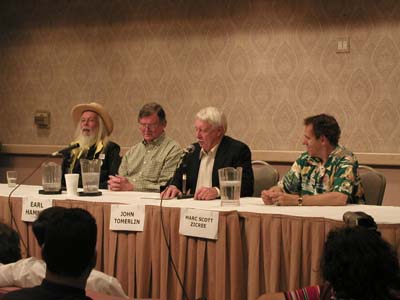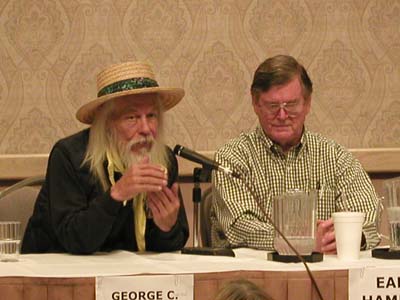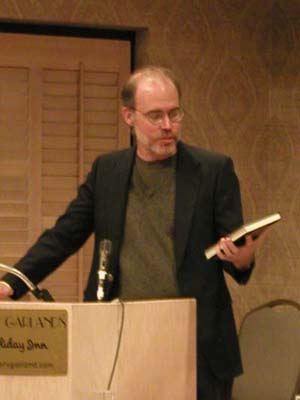Writer Panel
August 24, 2002 - 3:00 pm - Beverly Garland Hotel Theater

Note: These are in order of speaker and just briefly summarize each person's comments. The duration of this panel discussion was roughly 60 minutes. Some details may be outdated.
Christopher Conlon (host): Christopher introduced each panelist and talked a bit about his book "California Sorcery," about the group of Southern California writers including George Clayton Johnson, Charles Beaumont, and John Tomerlin, among many others. He also discussed a bit about a book in progress written by Jerry Sohl (writer of TZ episodes "Living Doll", "The New Exhibit, and "Queen of the Nile"), which will contain Sohl's stories as well as two TZ scripts that were cancelled after producer William Froug took over during the fifth season. Chris then asked, collectively, one question, "How did each of you get into "The Twilight Zone?" and let each panelist take it from there.
George Clayton Johnson: "Rod Serling had a monumental task. He was required by contract to write about two-thirds of the scripts for each season,
so he needed help with the other third. The first thing he did was to get the two best writers in town, Richard Matheson and
Charles Beaumont." Because of his friendship with Beaumont, George had an 'in' to "The Twilight Zone".
Beaumont was an inspiration to literally dozens and dozens of writers at that time, George included.
They became friends in the late 1950s and around 1958, George wrote the story "All of Us Are Dying".
He submitted it to Jay Richards of Famous Artists Agency (today known as ICM, International Creative
Management). Mr. Richards was not George's agent, but he agreed to submit material that
George had written that he thought looked promising. Before submitting "All of Us Are Dying" to
Cayuga Productions, he changed the title to "Rubberface" (since the story is about a man
who can change his face into the faces of other people). Rod Serling bought it and kept
most of the original title, "The Four of Us Are Dying." George watched the original broadcast on New Year's
Day, 1960, and was absolutely terrified. His doubts and disbeliefs vanished instantly when he saw how
Rod Serling took his "little story" and molded it into such a classy episode of television. This
was his first television credit.
Beaumont, Johnson, Bill Idelson, O'Cee Ritch (all of whom are known for their "Twilight Zone" work)
among several others, were a very close group of friends. They hung out together nearly every other
day for a period of several years. All were in their late twenties and all were intent on
becoming big-name writers. Beaumont taught George a great many things, including a lot
about world history and classical music. Rod Serling, later on, was part of their
gatherings. Rod was not a conversationalist, but instead, a world-class
storyteller who was content to relax with gin and cigarette in hand and tell stories.
Rod was always interested in what everyone else was doing and what
they were going to do next....of course, everyone was more interested in what Rod (by then the 'emperor' of TV) was doing.
Buck Houghton was known in those days as "the producer's producer" and usually Rod Serling
left all the big decisions to Buck. Neither Buck nor Rod cared to do any rewriting; if a story
idea was good, they figured, why mess with it? However, on more than one occasion, Rod objected
to parts of storylines and would work with these problems on his own.
During the filming of "The Intruder"--the great Roger Corman feature film
written by Beamont starring William Shatner, in which George also had a part--he got a call from Buck Houghton.
He and the rest of the cast were shooting in Missouri and Buck called to say that Rod didn't like the ending to "A Game of Pool" and
that it would be changed (so that Fats Brown, the retired pool champ, loses the game). The original ending was
changed to the one we know today, much to George's consternation. However, this was one of
only a few minor difficulties George had.
Director Lamont Johnson (no relation to George) was
an influential figure and added much to his scripts, in particular "Nothing in the Dark".
At the beginning of "A Penny for Your Thoughts",
Hector B. Poole was supposed to be hit by a car, which in turn was supposed to cause
his telepathy. Instead, it was agreed that a special effect of the coin landing on its
edge (accomplished by hooking the coin up to a wire and pulling it smartly), would be
more interesting. Later on in the discussion, George followed up a comment by Marc Zicree
about Rod having to write "Twilight Zone" much more universally (instead of focusing
so directly on specific historically dark events such as the hanging of black man Emmett Till,
which Rod wrote about twice and both times it was rejected).
George mentioned something to the effect of, "You can easily write about robots being
deprived of their 'civil rights', because everyone's heart in America will go out to a robot!"
In response to a question from the audience regarding George Clemens, George Johnson
spoke of Clemens with high regard. "That guy gave Twilight Zone its look. You could
look at one episode, and then another, and another … and you could tell they all
came from the same desk."
When asked what series he'd like to write for today, if he had a choice, George Clayton Johnson
said he'd like to write for "The Simpsons."
Earl Hamner, Jr.: Earl Hamner met Rod Serling in the late 1940s when they won the Dr. Christian Writing Competition. Later on, Earl held a job in Cincinatti at a radio station, which he eventually vacated and went to Arkansas to write a book. Rod took this job, which he desperately needed at the time. Much later, after they were both in Hollywood, Rod always credited Earl with being "the man who gave me my first job." Earl was a journalist prior to moving his family to California in the early 1960's, and was hoping to break into writing for television and film. He used all the money he had just on transportation and minimal living costs and his wife's family supported them for the first few, difficult months. Rod then gave Earl his first job, writing for "Twilight Zone". Earl was not sure he was up to the task of writing for such a distinguished show, but drafted his first episode, "The Hunt", which pleased Rod and Buck Houghton. They encouraged Earl to do more and kept asking what he'd like to try next. He then did "A Piano in the House". Later on, after Herbert Hirschmann and William Froug took over the producing chores, he faced a few problems, but they continued to accept all the scripts he wrote for the show. Chris Conlon commented on Earl's soon-to-be-released book of "Twilight Zone" scripts, with commentaries written by Tony Albarella. Earl also made the comment that he felt Buck and Rod were indeed with us in spirit at the convention. He credits them with giving him the opportunity to write for TV, something he didn't know if he could do or not. Later, Earl would create and write for, and narrate "The Waltons", which everyone today knows him for. When "The New Twilight Zone" was in production in the mid 80's, Earl met up with Rockne O'Bannon (series writer/producer) and told him that if the higher-ups wanted a new script, he'd be happy to provide. Unfortunately, the 'higher-ups' didn't want anything to do with the old writers!
John Tomerlin: John Tomerlin, like George Clayton Johnson, got into "The Twilight Zone" through his friendship with Charles Beaumont. His involvement with TZ was ever so brief; he wrote one script, "Number Twelve Looks Just Like You", in the fifth season. It is credited to both Tomerlin and Beaumont, alhough it was an entirely solo script written by Tomerlin. The script was overdue at the time, and the writing job was given over by Chuck because he had numerous projects at the time and simply couldn't do them all. John read from some memoirs he'd written up regarding his friendship with Beaumont (excerpted briefly here):
When John Tomerlin and Charles Beaumont were just twenty years old when they worked together at the California
Motor Express. Beaumont wanted to direct motion pictures and John wanted to get into radio.
John soon after got a job at a small job at a radio station in
Corona. Like Beaumont, Tomerlin was a radio fanatic and even to this day, vastly prefers radio
to TV. Chuck turned to drawing cartoons, and soon after, to writing. His first story (or one of the very first published) was "Printer's Devil", which John
remembers well because the villain was named Tomerlin. He'd written some episodes of "Lawman," "Maverick," "77 Sunset Strip"
and done some rewrites for those and other shows, and decided he wanted to do a novel.
Chuck and John had already done the novel "Run from the Hunter" under the pseudonym
Keith Grant (an agglomeration of their two sons' first names). In 1963, Chuck was enjoying
tremendous success as a writer. He'd done "The Seven Faces of Dr. Lao," "The Intruder," "The Wonderful World of The Brothers Grimm" (all features) and had contracts to
do even more. He was also balancing his feature film writing chores with chores
involving TV episodes. Late that year, Chuck and John took a train trip to New York,
and were planning on collaborating on another novel. John rented an
apartment in Greenwich Village. After conducting some business, Chuck soon left and went back to California
unexpectedly and called John to say that he didn't think he was going to make
it back out to New York for awhile. Somehow, John knew that Chuck would
not ever be returning. Meanwhile, John had started work on a book for young adults;
the second book they were to write never quite came to pass.
They would see each other again during John's brief trips back to California,
and it was clear to John that Chuck was not well. He had started farming out much of
his work to others; many thought this was a result of alcoholism. Chuck asked him to write a "Twilight Zone" episode for him,
and "Number 12 Looks Just Like You" was completed in just three days. In the spring of 1964, John went to Nice, France and rented
an apartment there, to start work on another book called "Challenge the Wind", about automobile racing. Shortly thereafter, he received
a letter from writer friend William F. Nolan stating that Chuck had been admitted to UCLA Medical Center
and diagnosed with Alzheimer's Disease. He didn't die until three years after, but John and others
had said their goodbyes long before in some form or other. Had Beaumont survived,
today he would undoubtedly still be working hard and inspiring everyone he came into
contact with.
When asked if he thought "Number Twelve" was a good piece of television, John admitted that he has not
yet seen the episode on TV. He has not purposefully avoided it and if it ever came on TV, he'd watch it and
sometime he will. However, the genesis of his having to write the episode was associated with the demise of Beaumont,
which was of course a difficult event in his life. Truth be told, some TV writers never do get a chance to see all their episodes
in finished form, especially if they've written a lot of them!
When asked if he would write for the "Newest Twilight Zone", John said he definitely would if
the producer's objective was a good one and if they were really out to get some quality segments
on the air. However, the philosophy and production values would have to be intact.
Marc Scott Zicree : Marc Zicree is, of course, best known for his book "The Twilight Zone Companion." Over the last twenty years, it has become the bible of "Twilight Zone". However, getting it onto the shelves was not easy. Marc's first TZ memory started when he was around six years old. He was up past his bedtime and the episode "Death Ship", written by Richard Matheson, came on. As he grew up, he watched "Twilight Zone", "The Outer Limits" and later "Star Trek". In 1977, two years after Rod Serling died, Marc was an art major in college and had never taken any journalism courses. He met George Clayton Johnson at a convention and told him of his wish to write a book on "Twilight Zone." Around the same time, Carol Serling had rejected a number of writers who had expressed interest in doing the same thing. Thanks to the recommendations of George and Buck Houghton, Carol Serling gave Marc access to her entire attic full of Rod's old scripts, stories, memorabilia. For Marc, this experience was much like crawling through Rod's brain (!). He wrote the "Companion" over a period of five years and after over twenty rejections by publishers, it eventually was bought by Bantam. However, the sale was made with the stipulation that all the information about the writers be deleted. They didn't want any information about Rod Serling, George Clayton Johnson, Earl Hamner, Richard Matheson, or any of the others who wrote for the show. The reasons for this are unclear but seem to point towards wanting to keep the book as short as possible, to serve as a viewer's guide to TZ. However, Marc insisted that this not be changed, and instead, told them that they could choose whatever production photos they wanted to put in the book. They consented, and published the book's first edition in 1982.
When asked why the original series was so good and why the 1983 movie was so bad, Marc had an easy answer: the producers relied on gimmicks instead of "the heart" and the sentimental. The writers who re-vamped the segments into movie format did not care much about preserving the original flavor of the old series. And in many ways, the movie was a mistake. He also pointed out that writers have to "write who they are". Many of his colleagues, fellow TV writers, often turn to "Twilight Zone" episodes for inspiration. Not for copying the ideas in the stories, but because everyone knows that those episodes are really and truly quality material. And so much TV today is so poor as a result of this lack of 'writing from an authentic self.'

George Clayton Johnson and Earl Hamner

Acclaimed author Chris Conlon, panel moderator
